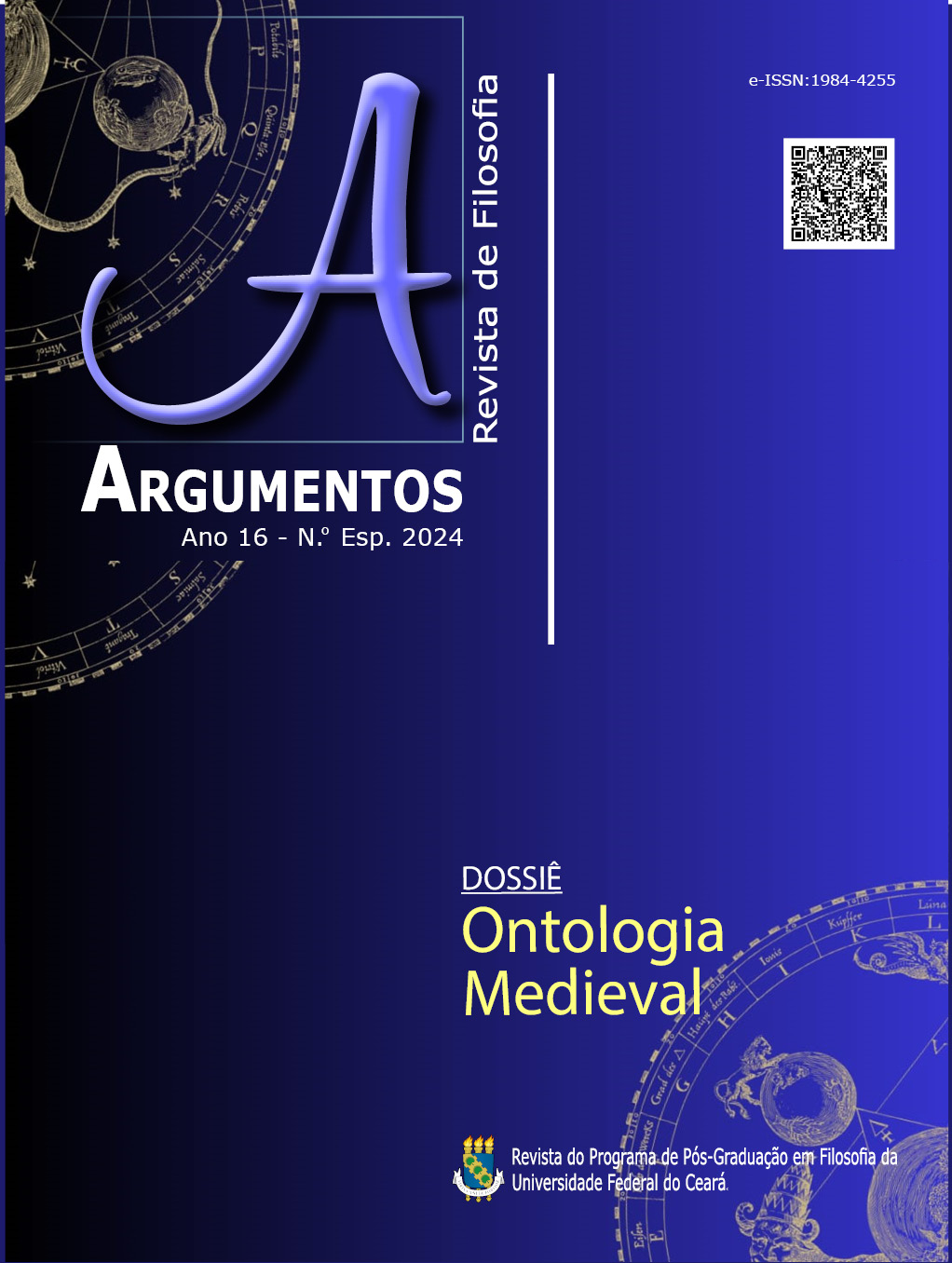Henology: implications for the apprehension of reality and knowledge in philosophy of Proclus
Keywords:
Henology. Knowledge. Human.Abstract
In Proclu’s philosophy, there is a shift from an ontological to a henological perspective, as the reference point is unity rather than being. Starting from the Proclean perspective, which considers unity as the foundation of existence, this work investigates the relationship between the intelligible hypostasis and knowledge, taking into account the issue that Noûs is not the first term in the Proclean system. In light of this, the elements involved in knowing are analyzed, as well as the way cognitive activity occurs within the realm of reality. Finally, the investigation turns to the human understanding of the apprehension of reality, presenting how hypostases are understood by human beings based on their own mode, which finds in rationality a central aspect.
References
ARISTÓTELES. Metafísica. Volume II. Ensaio introdutório, texto grego com tradução e comentário de Giovani Reale. Trad. Marcelo Perine. 3 ed. São Paulo: Loyola, 2013.
BEIERWALTES, W. Proclo: Il fondamenti dela sua Metafisica. Trad. Nicoletta Scotti. Milano: Vita e Pensiero, 1990.
GARAY, J. de. Inteligencia y dialéctica en Proclo. Thémata. Revista de Filosofía, Sevilla, n. 50, 2014, p. 95-111.
OS PRÉ-SOCRÁTICOS. Fragmentos, doxográfias e comentários. Seleção de textos e supervisão José Cavalcante de Souza. Trad. José Cavalcante de Souza, Anna Lia Amaral de Almeida Prado. 4. ed. São Paulo: Nova Cultura, 1989. (Col. Os Pensadores).
PLATÃO. Protágoras. Trad. Carlos Alberto Nunes. Belém: EDUFPA, 2002.
PROCLO. Commento al I libro degli Elementi di Euclides. Introduzione, traduzione e note a cura di Maria Timpanaro Cardini. Pisa: Giardini, 1978.
PROCLO. Elementos de Teología. Sobre la providencia, el destino y el mal. Edición y traduccion de José Manuel García Valverde. Madrid: TROTTA, 2017.
PROCLO. Lectura del Crátilo de Platón. Edición de Jesús Maria Álverez Hoz, Ángel Gabilondo Pujol y José M. García Ruiz. Madrid: Akal, 1999.
PROCLO. Os elementos da teologia. Tradução de Antonio Vargas. São Paulo, Odysseus, 2024.
PROCLO. Teología platónica. I-III. Introducción, traducción y notas José Maria Nieva. Buenos Aires: Losada, 2015.
PROCLOS. Éléments de Théologie. Traduction, introduction et notes par Jean Trouillard. Paris: AUBIER Montaigne, 1995.
PROCLUS. Commentaire sur le Timée. Traduction et notes par A. J. Festugière. Paris: J. VRIN, 1967.
PROCLUS. Sur le Premier Alcebiade de Platón. Tome I. Texte établi et traduit par Alain-Philippe Seconds. Paris: Les Belles Lettres, 2003.
PROCLUS. Théologie Platonicienne. Livre I. Texte établi et traduit par H. D. Saffrey et L.G. Westerink. Paris: Les Belles Lettres, 1968.
REEGEN, J. G. J. ter. Deus não pode ser conhecido. A incognoscibilidade divina no Livro dos XXIV Filósofos (XVI e XVII) e suas raízes na tradição filosófica ocidental. Mirabilia: electronic journal of antiquity and Middle Ages. n. 2, 2002, p. 150-157.
ROSÁN, L. J. The Philosophy of Proclus: the final phase of Ancient thought. New York: COSMOS, 1949.
TROUILLARD, J. Âme et sprit selon Proclus. Revue des Etudes Augustiniennes, Paris, v. 5, n. 1, 1959, p. 1-12.
TROUILLARD, J. Mystagogie de Proclus. Paris: Les Belles Lettres, 1982.
WILSON, C. Relación del pensamiento con el conocimiento. In: GRIFFITHS, A. Phillips (Ed.). Conocimiento y creencia. Lecturas filosoficas de Oxford. Trad. Francisco Caracheo. México; Madrid; Bueno Aires: Fondo de cultura económica, 1967.
Downloads
Published
Issue
Section
License
Copyright (c) 2024 Suelen Pereira da Cunha

This work is licensed under a Creative Commons Attribution 4.0 International License.
Argumentos magazine is licensed under an International Creative Commons Attribution License.
The Magazine uses CC BY inclusion
1) The authors retain the copyright granted to the magazine or the right to initial publication, with the work regularly licensed under the Creative Commons Attribution, which allows the sharing of the work with acknowledgment of authorship and initial publication in this magazine.
2) The authors are authorized to contract additional applicable contracts, for non-exclusive distribution of the version of the work published in this journal (for example, publication in the institutional repository or as a chapter of the book), recognition of authorship and initial publication in this journal.
3) Authors are authorized and encourage to publish and distribute their work online (for example, in institutional repositories or on their personal pages) at any time before or during the editorial process, as they can generate productive changes, as well as increase the impact and reference of published work.




.jpg)










._._3.png)
1.jpg)
._._._.png)
